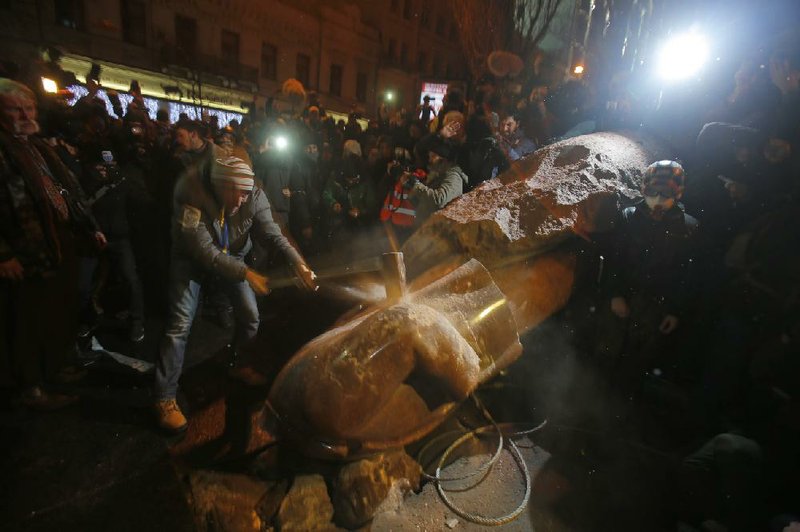KIEV, Ukraine - Hundreds of thousands of protesters poured into the streets of Ukraine’s capital on Sunday, toppling a statue of former Soviet leader Vladimir Lenin and blockading key government buildings in an escalating standoff with the president over the future of the country.
The biggest demonstration in the former Soviet republic since Ukraine’s pro-democracy Orange Revolution in 2004 led the government to fire back. It announced an investigation of opposition leaders for a purported attempt to seize power and warned the demonstrators that they could face criminal charges.
The West pressed for a peaceful settlement.
Hundreds of thousands of Ukrainians flooded the center of Kiev, the capital, to demand President Viktor Yanukovych’s ouster after he ditched ties with the European Union in favor of Russia and sent police to break up an earlier protest in the nearly three-week standoff.
“Ukraine is tired of Yanukovych. We need new rules. We need to completely change those in power,” said protester Kostyantyn Meselyuk, 42. “Europe can help us.”
Packing Independence Square as far as the eye could see, Ukrainians waving EU flags sang the national anthem and shouted “Resignation!” and “Down with the gang!”
“I am convinced that after these events, dictatorship will never survive in our country,” world boxing champion and top opposition leader Vitali Klitschko told reporters. “People will not tolerate when they are beaten, when their mouths are shut, when their principles and values are ignored.”
Opposition leaders told the crowds they’d met their goal of 1 million people.
The Interior Ministry estimated the turnout at more than 100,000. RBC-Ukraine reported more than 500,000 people attended the rally, while Ukraine’s business news wire, Ukraynski Novyny, said about 600,000 people were on the capital’s streets Sunday.
“The turnout allows the opposition to continue pressing Yanukovych and his government,” said Olexiy Haran, a professor of comparative politics at the National University of Kiev-Mohyla Academy. “The public mood is building. The question is whether Yanukovych will listen. He doesn’t want to resign - he doesn’t even want to react or look for possible compromise.”
As darkness fell, the conflict escalated further with protesters blockading key government buildings in Kiev with cars, barricades and tents.
The protests have had an anti-Russian component because Russia had worked aggressively to derail the EU deal with threats of trade retaliation against Ukraine.
Yanukovych, whose government is searching for $10 billion to avoid a possible default, last week met Russian President Vladimir Putin.
Putin’s spokesman, Dmitry Peskov, said that Russia and Ukraine were now “significantly” closer in energy negotiations after the meeting. Russia has said it would offer Ukraine cheaper natural gas if Ukraine signs up to a Customs Union intended to rival the EU.
About half a mile from the main square, one group of anti-government protesters toppled the city’s landmark statue of Lenin and decapitated it Sunday evening.
Protesters then took turns beating on the torso of the fallen statue, while others lined up to collect a piece of the stone.
The demonstrations broke out last month after Yanukovych shelved a long-planned treaty with the 28-nation European Union to focus on ties with Russia. They were also galvanized by police violence and fears that Yanukovych was on the verge of uniting his country with the Russian-led Customs Union.
“It’s not just a simple revolution,” Oleh Tyahnybok, an opposition leader with the national Svoboda party. “It’s a revolution of dignity.”
Yet a solution to the crisis appeared elusive, with the government making no concessions and the opposition issuing contradictory statements on how to proceed.
Heeding the opposition’s calls, thousands of protesters blocked the approach to key government buildings in Kiev by erecting barricades, setting up tents and parking vehicles, including a giant dump truck.
“We are extending our demonstration. We are going to fight until victory. We will fight for what we believe in,” opposition leader Arseniy Yatsenyuk told protesters on Independence Square, which was drowning in a sea of flags.
The West, meanwhile, scrambled to avoid violence and urged dialogue.
In a phone conversation with Yanukovych, European Commission President Jose Manuel Barroso stressed “the need for a political” solution and dispatched EU foreign policy chief Catherine Ashton to Kiev in the forthcoming days to mediate a solution.
Information for this article was contributed by Jim Heintz, Yuras Karmanau and Maria Danilova of The Associated Press and by Ilya Arkhipov, Kateryna Choursina, Daryna Krasnolutska, Helena Bedwell, Ott Ummelas, Henry Meyer, Brian Parkin and Jonathan Stearns of Bloomberg News.
Front Section, Pages 1 on 12/09/2013

